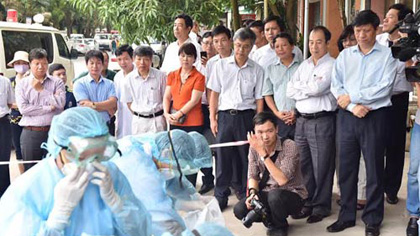US promotes capacity for Vietnamese epidemiologists
The fourth annual National Field Epidemiology Training Program Scientific Conference took place in Da Nang on April 22nd, showcasing over 35 public health research projects from national, regional, and provincial public health institutes in Vietnam.
 |
Organized by the Vietnam’s Ministry of Health General Department of Preventive Medicine, the three-day scientific conference also included the graduation of two classes of Field Epidemiology Training Program (FETP) fellows, an induction of the seventh class of FETP fellows, and the launch of an alumni network to strengthen information sharing and training of FETP alumni.
Over 100 public health leaders in Vietnam attended, including international participants from the US Centers for Disease Control and Prevention (US CDC), the World Health Organization (WHO), and FETP fellows from Australia, the Philippines, and Indonesia.
Photo for illustration. (Source: 24h.com.vn)
“FETP fellows are the frontline of any strong public health system. When a disease outbreak occurs, such as in the recent Zika virus cases in Vietnam, they are the “disease detectives-epidemiologists” that go into the field and investigate the outbreak. Through the program, they receive hands-on training and mentoring to use scientific approaches to identify causes and trends of public health issues,” said Dr. Anthony Mounts, Country Director of the US CDC in Vietnam.
Supported by the US CDC, WHO, Training Programs in Epidemiology and Public Health Interventions Network (TEPHINET), and South Asia Field Epidemiology and Technology Network (SAFETYNET), FETP in Vietnam is a two-year program led by the General Department of Preventive Medicine aimed to build trained epidemiologists who can rapidly respond to disease outbreaks and other public health events.
Currently, there are 22 field epidemiologists who have completed the program since FETP was established in the nation in 2009. FETP fellows have contributed to public health through their involvement of outbreak responses such as cholera, avian and pandemic influenza, and hand foot and mouth disease.
During the program, fellows conduct independent research studies which are then used to inform timely and effective disease outbreak response. Research topics include zoonotic diseases transmitted from animals to humans, foodborne diseases, vaccine preventable diseases and immunization, HIV/AIDS and other communicable diseases.
(Source: CPV)
 về đầu trang
về đầu trang







